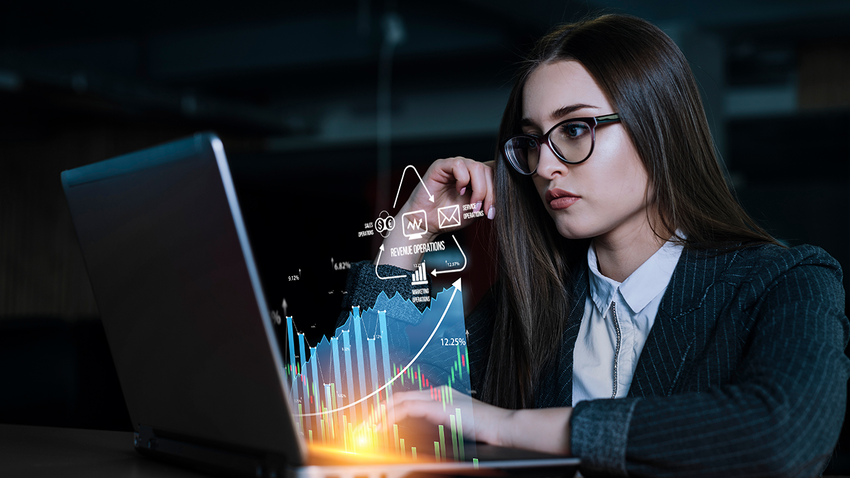
Order books have been helpful to traders in the conventional financial system. Although it still has value, things have changed due to the quick rate of technological development since the trading floor has gone online; every minute and second counts in determining whether the market experiences significant gains or losses. It may be a massive burden for a broker to control price volatility. Algorithmic trading is used to achieve this. As the name suggests, this type of trading is where choices may be made automatically utilising software-written algorithms. Algorithms that execute trades regularly are known to many traders. They were among the first varieties of trade automation software. So, our area of focus for today will be how algorithmic trading can revolutionise stock market trading, especially in the Indian context.
Table of Contents
Algorithmic Trading Revolutionising Stock Market Trading
Algorithms are referred to as “algos”, and “algo-trading” is the practice of using algorithm-based software to automate all trading operations. Here, you use automated software to manage the trading process. Algo-trading software can be written in a variety of computer languages, including Java, Perl, Python, C++, Matlab, MQL, and others.
Traders use algorithmic trading for various purposes, such as automating trading strategies, executing trades at high speeds, and managing risk. High-frequency trading (HFT) is a specific form of algo-trading that involves executing a large number of orders at extremely high speeds, often within milliseconds.
Traders can choose or develop algorithms that fit their specific trading goals and preferences. It’s worth noting that algorithmic trading requires a good understanding of financial markets, quantitative analysis, and programming skills to design and implement effective trading strategies.
Decoding Algorithmic Trading
In algorithmic trading, a deal is placed by a computer program that adheres to a predetermined set of guidelines (an algorithm). The described steps are not based on any mathematical model or timing, cost, or quantity consideration. In addition to providing the trader with possibilities for profit, algo-trading increases market liquidity and standardised trading by minimising the influence of human emotions and mistakes. Algo-trading has the advantage of having capabilities like back-testing, which lets users test their strategy and see how it does. Algo-trading simulations may be used to evaluate your approach in real time while avoiding actual trades. However, algorithms should only be applied when the user is precise regarding their trading strategy.
The Beginnings of Algorithmic Trading in India
By granting institutional clients a Direct Market Access capability on April 3rd, 2008, the Securities and Exchange Board of India (SEBI) launched algorithmic trading. In essence, DMA allows brokers to provide customer service to their infrastructure and the exchange trading system regardless of their participation. It was initially made available only to institutional clients rather than regular dealers. By the time some of the most prominent players in the world signed up for the DMA facility on April 29th, 2008, it had already gained popularity. UBS, Morgan Stanley, JP Morgan, and DSP Merrill Lynch were just a few of the FIs and FIIs waiting for permission. By July 31st, 2008, significant brokerages and stock exchanges had begun laying the groundwork for implementing Direct Market Access (DMA).
Algo-trading Revolution and Trends
The development of artificial intelligence (AI) is a significant driver of market growth in India. Through portfolio diversification, the nationwide dispersion of savings, and risk sharing, AI helps to provide effective trading opportunities. In addition, the market is expanding due to the growing popularity of cloud computing in both developed and developing countries. Companies offer cloud-based trading alternatives to automate the trading process, cut operating expenses, and provide customers with transactional flexibility. To offer market regulatory monitoring and identify fraudulent actions in the automated trading system, dealers are also creating risk management systems.
Algorithmic Trading Advantages
Given the absence of human involvement, the likelihood of mistakes is quite low, provided that the programmed instructions are correct. The system recognises the trading signals of the financial market using the codes and then determines whether to pursue them or not. Systems are fed by algorithmic trading software, which serves the needs of both buyers and sellers. As soon as the algorithm finds an optimal match, the transaction starts and closes immediately. Consequently, traders are obligated to complete the transactions as soon as they are informed of a match. They must wait for another mate to be found if the opportunity is lost.
The Future Possibilities of Algo-trading
Making the most of the stock market requires a complicated trading activity involving mental and analytical awareness. It expressly calls for resources, time, and focus. The investor’s path in trading is constantly motivated by potential profits. As the industry has grown and become more powerful, technology has been playing a significant role. It not only made trading easier but also saved time and money. Algorithmic trading undoubtedly assisted the market and investors in recovering from the lows when the stock market crashed in March 2020 as a result of the coronavirus. Algorithmic trading has completely changed the trading landscape.
Conclusion
In conclusion, algo-trading platforms enable customers to fully automate the investment process. This is perfect for those interested in investing but who need more awareness of how the financial markets operate. Algo-trading platforms are also ideal for investors who need more time to devote to conducting extensive research on financial instruments. Hence, there isn’t any hesitation in saying that the algo-trading revolution is spreading its influence every single day.